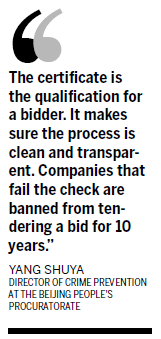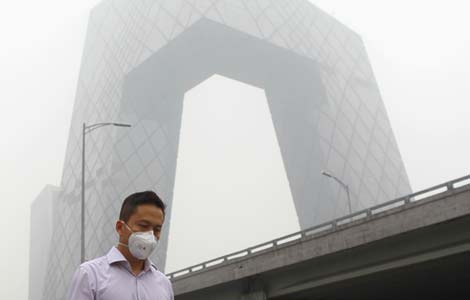Firms need clean slate to bid for projects
Updated: 2013-07-02 08:03
By Cao Yin (China Daily)
|
||||||||

Certificate clearing construction companies of bribery required
Chen Jiaxu's construction company has a clean record when it comes to bribery - and he has the certificate to prove it.
The document, issued by the Beijing People's Procuratorate, shows Huaijian Group has not been involved in corruption in the past 10 years.
Without it, the company would be barred from bidding for any government project.
"We need to apply for the certificate every time we want to bid for a contract," Chen said, estimating he has successfully applied 20 times since October. "It's something we have to have now."
A center to evaluate and analyze the eligibility of bidders for government projects - often worth millions of yuan - went into operation in Beijing last year.
Like similar offices nationwide, it uses a database set up in 1997 containing information on individuals and enterprises convicted of bribery.
Although authorities have run background checks on bidders since 2006, this year administrations in nine Beijing districts, including the housing and disciplinary commissions, became the first to make the clean-record certificates mandatory for all projects, Yang Shuya, director of crime prevention at the procuratorate, said on Monday.
Her office has handled 3,527 applications so far, and the number continues to rise, she said. Compared with 2007, when just 31 certificates were issued, last year the authority handed out 528.
In Huairou district, where Huaijian Group is based, prosecutors have received 1,925 applications, with seven declined - three enterprises and two individuals - for bribery convictions.
One company was rejected after it was discovered it had paid a fine of 100,000 yuan ($16,300) for corruption committed in 2007 and 2008 during a construction project in the Inner Mongolia autonomous region.
"The certificate is the qualification for a bidder. It makes sure the process is clean and transparent," Yang said. "Companies that fail the check are banned from tendering a bid for 10 years."
Song Hua, who is in charge of discipline for a railway construction company in Beijing, which he asked to remain anonymous, said the system is not complex.
Applications are usually processed in three days, he said, "or even in one if the company is in urgent need".
Although Beijing is the only place where the certificates are mandatory for government projects, Song said his company voluntarily submitted one issued by the capital to help win a subway construction contract out for tender in Kunming, Yunnan province.
"If companies without good records are blocked, then the system is fairer," Song said.
After the bidding is finished, regulations also state results must be released to the public, and a window of 10 days must be allocated to allow for appeals to the prosecution authority, which can investigate again for any evidence of corruption.
Caution urged
Government insiders and industry experts largely support the move to make the certificates mandatory. Yet some urge caution over the risk of counterfeits and human error.
Hao Jingxia, deputy director of Huairou District's housing commission, said prosecutors must be extra careful with verifying the facts.
In Beijing's Chaoyang district in May, authorities almost rejected an applicant after an initial search indicated he had a criminal record for bribery in Gansu and Qinghai provinces.
"But we didn't rush," prosecutor Wu Bin said. "Instead, we checked his personal information again and found the convictions were against someone with the same name."
After the discovery of a fake certificate in April, she said every certificate in Beijing now carries a code that can be scanned with a cellphone and verified on the issuing authority's website.
However, Hu Min, a researcher at the Chinese Academy of Governance, said he doubts the certificates can prevent corruption.
"The process is not entirely open to the public, so there are still opportunities for dirty tricks," he said, referring to the fact many companies use guanxi, or good connections, to secure lucrative contracts. Therefore, he added, a 10-year ban is unlikely to affect large enterprises.
Ruan Chuansheng, a criminal lawyer in Shanghai, said the effect of the system will be limited.
"We can't rule out the fact that some case details are not accurate when put into the database by prosecutors," he said.
"How to ensure this system is not superficial is the key," he added. "Enforcement is vital."
caoyin@chinadaily.com.cn
(China Daily USA 07/02/2013 page5)

 Egypt army gives Mursi 48 hours to share power
Egypt army gives Mursi 48 hours to share power
 No quick end in sight for Beijing smog
No quick end in sight for Beijing smog
 New filial law sparks debate
New filial law sparks debate
 Bakelants claims Tour de France second stage
Bakelants claims Tour de France second stage
 2013 BET Awards in Los Angeles
2013 BET Awards in Los Angeles
 Gay pride parade around the world
Gay pride parade around the world
 Four dead in Egypt clashes, scores wounded
Four dead in Egypt clashes, scores wounded
 New NSA spying allegations rile European allies
New NSA spying allegations rile European allies
Most Viewed
Editor's Picks

|

|

|

|

|

|
Today's Top News
Kerry hails China's denuclearization bid
19 firefighters killed in Arizona fire
Book reveals islands' true history
Tokyo warned not to resort to 'empty talk'
Snowden applies for Russian asylum
No quick end in sight for Beijing smog
New home prices defy curbs
Mandela 'still critical but stable'
US Weekly

|

|






